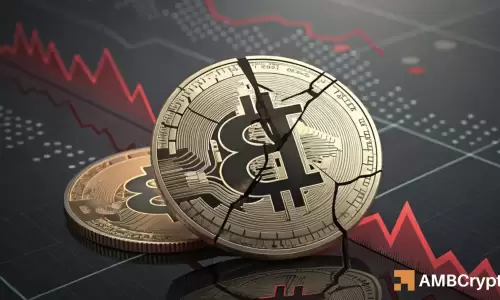 |
|
 |
|
 |
|
 |
|
 |
|
 |
|
 |
|
 |
|
 |
|
 |
|
 |
|
 |
|
 |
|
 |
|
 |
|
Articles d’actualité sur les crypto-monnaies
Someone Paid a Bitcoin Developer to Eliminate OP_RETURN's Datacarrier Limit
May 07, 2025 at 01:53 am

According to Samson Mow, someone paid a senior Bitcoin developer to write the year’s most contentious code change request to eliminate OP_RETURN’s datacarrier limit from Bitcoin Core’s default mempool.
Rather than the idea emerging organically from a grassroots discussion among Bitcoin community members, Mow claims that pull request (PR) 32359 was a corporate initiative from the start.
During initial discussions on the Bitcoin-Dev Mailing List and GitHub, Chaincode Labs’ Antoine Poinsot and PR author Peter Todd expressed cultural and technical reasons for removing the “nudge of” OP_RETURN’s datacarrier limitation that had allegedly become “ineffective” at deterring non-financial, on-chain data storage.
Later Bitcoin developers joined in with historical context on spam filters, convinced that the modification request was a genuine request to normalize the placement of non-financial data on Bitcoin blocks across OP_RETURN, witness, and other areas of transactions.
Finally, however, Todd stated his primary motivation for his proposal was an economic one. In a StackerNews response, he stated, “For the record, this wasn’t my idea; I was asked to open it by an active Core dev because entities like Citrea are using unprunable outputs instead of OP_Return, due to the size limits.”
In Mow’s view, this meant that someone at Chaincode, like Poinsot, paid off Todd in a sort of “PR laundering.”
Poinsot responded to the accusation, saying that he personally didn't pay Todd but claimed ignorance about other people at Chaincode. “Did Chaincode pay Peter to open this PR? That sounds pretty surprising to me.”
Poinsot then shot back at Samson, calling him a “desperate attention grabber” who mistakenly thought his followers were “that stupid” to believe the accusation.
A revival of the Bitcoin OP_RETURN coding mashup
For background, this year’s heated disagreement over non-financial data in Bitcoin’s blockchain is a continuation of its late-2010 OP_RETURN coding mashup. In fact, even Satoshi Nakamoto was beginning to comment on arbitrary data publications into Bitcoin’s blockchain.
Conservatively, Satoshi introduced a restriction on transaction types, displaying a preference for keeping the blockchain streamlined and focused on financial transactions. Satoshi implied that projects needing large data storage, like BitDNS/Namecoin, should use a separate blockchain linked into Bitcoin’s proof-of-work rather than embedding all data on its main chain.
Last week, a group of Chaincode and Brink developers attempted to increase OP_RETURN’s datacarrier limit from approximately 80 to hundreds of thousands of bytes for Bitcoin Core’s default mempool.
They maintained the change was trivial, a simple "modernization" for mempool filters that acknowledged the ease of storing non-financial data elsewhere on Bitcoin’s ledger.
Defending the 80-byte filter, a group of independent and Knots node operators stated that the rushed, corporately-influenced proposal would push Bitcoin down a slippery slope of tedious transaction validation and non-financial data storage.
In their view, it was the first of a "thousand cuts" and an obvious sabotage of Bitcoin’s monetary network by "spammers" who are trying to turn it into "just another database."
Is PR 32359 actually going to happen?
Blockstream engineer and Core contributor Greg Sanders stated that Core was planning to include PR 32359 in the next software update.
Updates about the intention of Core maintainers are changing rapidly, and it’s not clear whether the new software version will actually include the OP_RETURN datacarrier modification.
Votes and participation on the GitHub for the PR are closed. Several developers voted for and against the proposal. Bitcoin full nodes running Knots, signaling opposition to the PR, have come online to an all-time high for the year.
GitHub administrators have censored the debate, and #FixTheFilters continues to trend on social media as the discussion persists.
Many critics are blaming Core for catering to corporate interests instead of concentrating on Bitcoin’s development as a non-fiat monetary network.
Clause de non-responsabilité:info@kdj.com
Les informations fournies ne constituent pas des conseils commerciaux. kdj.com n’assume aucune responsabilité pour les investissements effectués sur la base des informations fournies dans cet article. Les crypto-monnaies sont très volatiles et il est fortement recommandé d’investir avec prudence après une recherche approfondie!
Si vous pensez que le contenu utilisé sur ce site Web porte atteinte à vos droits d’auteur, veuillez nous contacter immédiatement (info@kdj.com) et nous le supprimerons dans les plus brefs délais.
-

- Velo Universe, Dex et Defi Security: naviguer dans l'avenir du trading décentralisé
- Aug 05, 2025 at 07:45 am
- Exploration de l'évolution des échanges décentralisés (DEX) en mettant l'accent sur l'univers Velo, la sécurité Defi et la transition vers des plateformes de trading transparentes centrées sur l'utilisateur.
-

- Le portefeuille Bitget révolutionne Solana avec des transactions sans gaz: une nouvelle ère pour Defi
- Aug 05, 2025 at 07:36 am
- Bitget Wallet conduit la charge pour rendre Solana plus accessible avec des transactions sans gaz, simplifiant Defi pour tout le monde. Découvrez comment cette innovation remodèle l'expérience utilisateur.
-

- Ozak Ai, Boom crypto et potentiel de retour sur investissement: est-ce la prochaine grande chose?
- Aug 05, 2025 at 07:30 am
- Plongez dans le potentiel d'Ozak Ai dans le boom de la cryptographie. Ses outils commerciaux alimentés par l'IA peuvent-ils fournir un retour sur investissement explosif? Nous explorons les tendances et les idées.
-

- Les ETF de Solana et la poursuite de tous les temps High: Sol est-il défini sur Soar?
- Aug 05, 2025 at 07:30 am
- Le buzz de Solana est de retour! La spéculation du FNB, la croissance du réseau et la manie de la pièce mème pourraient pousser Sol vers un nouvel ATH. Mais y a-t-il d'autres joueurs dans le jeu?
-

-

-

-

- Bitcoin, Michael Saylor et Stratégie: un mastodonte de transformation numérique
- Aug 05, 2025 at 07:01 am
- Explorez la stratégie de Bitcoin audacieuse de Michael Saylor, les avoirs massifs de Microstrategy et le paysage évolutif de l'adoption de la cryptographie d'entreprise. Wall Street se fait-il enfin?
-

- Les détenteurs de Bitcoin se préparent à la sortie du marché au milieu des signaux baissiers
- Aug 05, 2025 at 07:00 am
- Les détenteurs de bitcoins à long terme montrent des signes de sortie du marché en tant que statistiques clés flash les signaux baissiers, suggérant une correction potentielle malgré des prix élevés.





























































